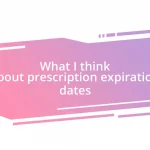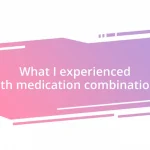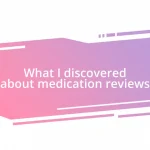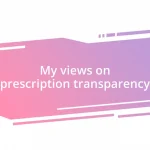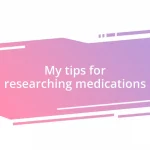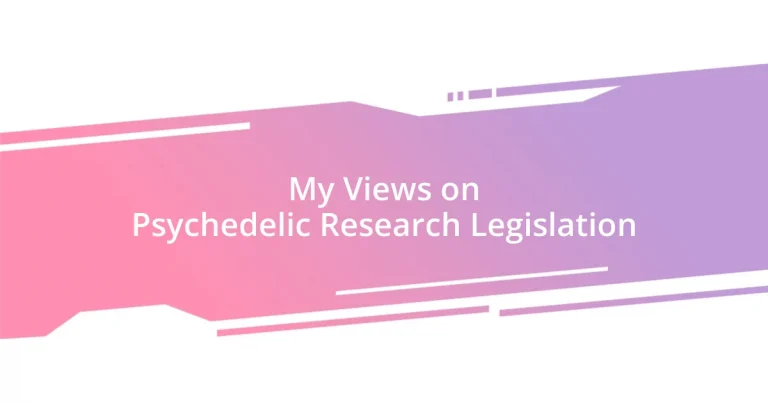Key takeaways:
- Psychedelic research shows promising therapeutic benefits for mental health conditions like depression, anxiety, and PTSD, challenging traditional treatment approaches.
- Legislation significantly influences psychedelic research, impacting research opportunities, participant safety, and the pace of scientific discovery.
- Successful case studies, such as Oregon’s legalization of psilocybin therapy, demonstrate how legislative changes can foster community support and innovative mental health solutions.
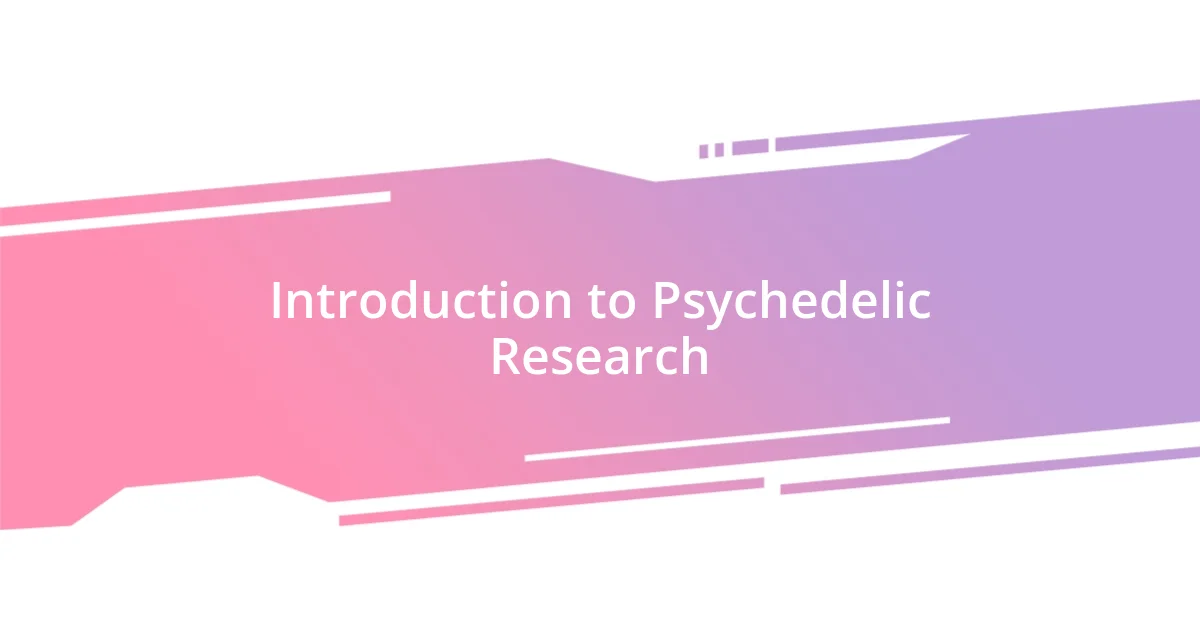
Introduction to Psychedelic Research
Psychedelic research is emerging as a fascinating field, challenging long-held perceptions of these substances. I remember my first exposure to this topic, feeling both intrigued and skeptical; could substances like psilocybin really have therapeutic benefits? As the stigma fades, we’re learning that these compounds may offer profound insights into mental health treatment.
Over the years, studies have shown promising results for conditions like depression, anxiety, and PTSD. I often find myself questioning the traditional approaches we’ve relied on for so long. Isn’t it time we explore alternatives that might actually connect with people on a deeper emotional level?
As researchers delve deeper into the mechanisms behind psychedelics, the potential they hold becomes increasingly exciting. I feel a rush of hope when I read about trials demonstrating real-world applications of these substances. The possibility that psychedelics can not only heal but also enhance our understanding of the mind is a conversation that I believe we all should be having.
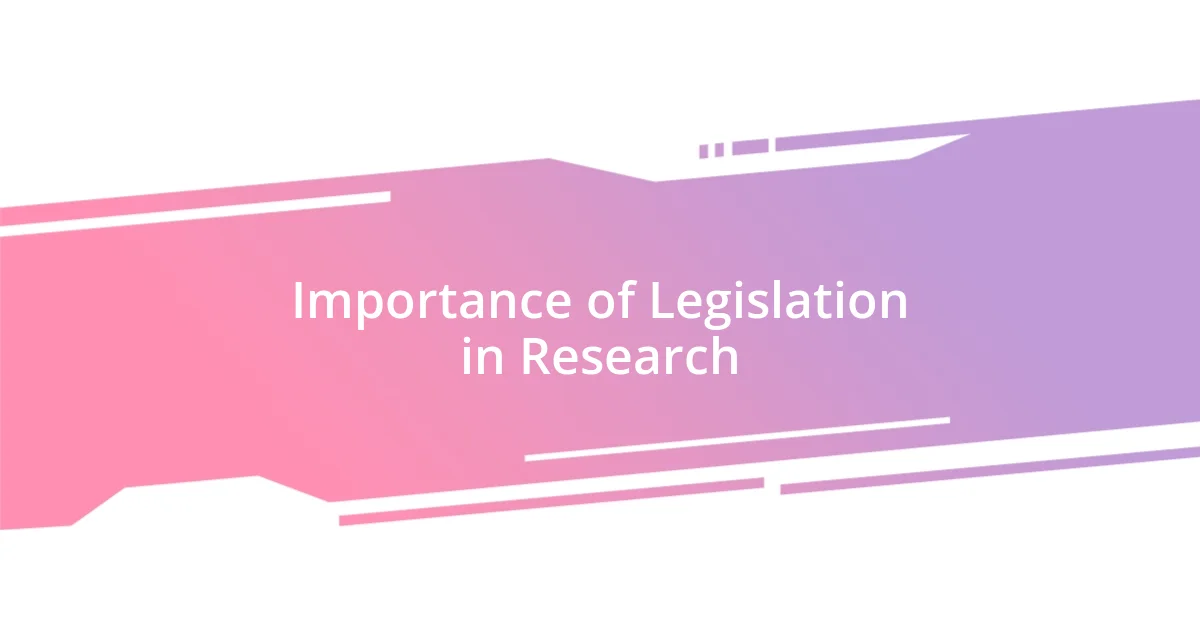
Importance of Legislation in Research
Legislation plays an essential role in the realm of psychedelic research. I’ve seen firsthand how the approval process can either open doors or shut them tight, influencing which studies can move forward and which ones are left to languish in uncertainty. When restrictions are relaxed, it creates a vibrant space for researchers to explore tantalizing possibilities that could change lives.
The landscape of psychedelic legislation is like a pendulum, swinging back and forth between regulation and freedom. Just recently, I chatted with a researcher who described the excitement of navigating the evolving legal frameworks. They felt a sense of urgency; every passing day could mean a new opportunity or a lost chance to uncover critical insights. I can’t help but think about how this ebb and flow directly impacts the pace of scientific discovery.
In my view, clear and balanced legislation is crucial to safely harnessing the potential benefits of psychedelics. It’s a fine line to walk, balancing safety, ethics, and innovation. When regulations are thoughtfully crafted, they not only protect participants but also foster a collaborative environment where breakthrough ideas can flourish.
| Aspect | Impact of Legislation |
|---|---|
| Research Opportunities | Enables or restricts studies based on current laws |
| Participant Safety | Establishes guidelines to protect those involved in research |
| Innovation Speed | Affects how quickly new findings can be applied |
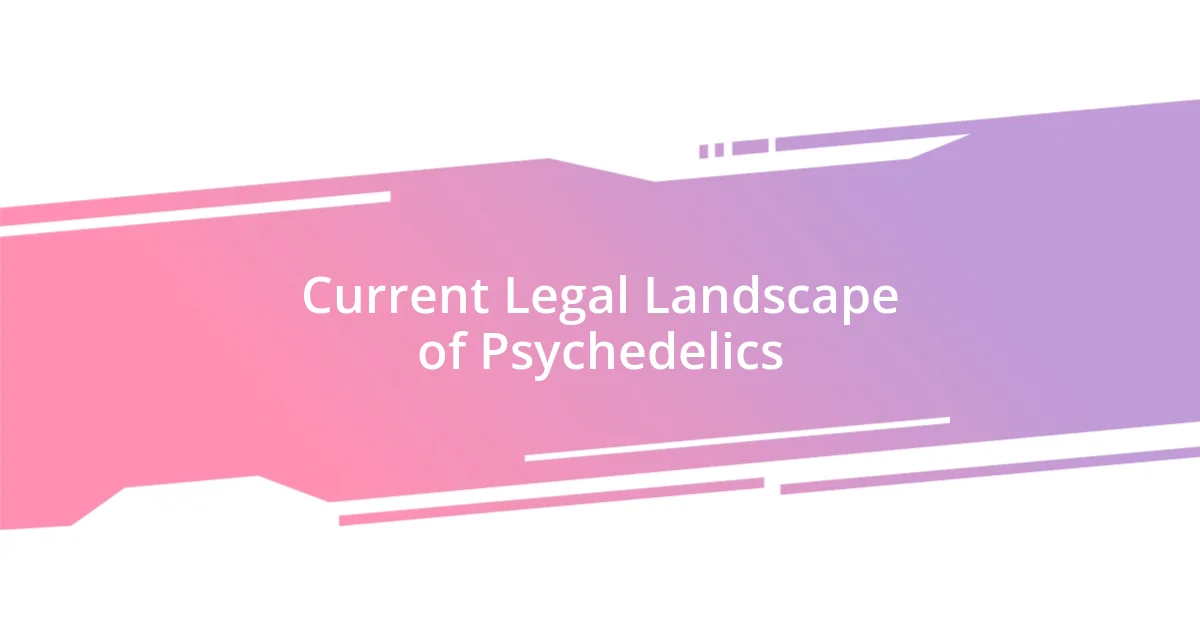
Current Legal Landscape of Psychedelics
The current legal landscape of psychedelics varies significantly across different regions, and it feels like we’re witnessing a revolution. For example, I recall attending a local seminar where experts discussed the recent decriminalization movements in places like Oregon and Colorado. The atmosphere buzzed with hope as attendees shared their stories of how these changes resonated with personal experiences of healing through psychedelics. When I see these shifts, it sparks a sense of excitement for the future and the potential for broader acceptance.
- In the U.S., psilocybin has been decriminalized in various cities.
- Some states are exploring legal frameworks for medical use of psychedelics.
- Internationally, countries like Canada are beginning to permit controlled psychedelic therapy.
- Ongoing advocacy efforts could influence future policies and expand access.
It’s astounding to see how quickly the dialogue around psychedelics is evolving. Just last week, I stumbled upon an article highlighting new clinical trial designs that allow for more flexible approaches. I find it particularly encouraging that more lawmakers are actively engaging with researchers to understand the therapeutic implications. This collaboration could usher in an era where safe access to psychedelics becomes reality, and I can’t help but feel a renewed sense of purpose in advocating for such meaningful change.
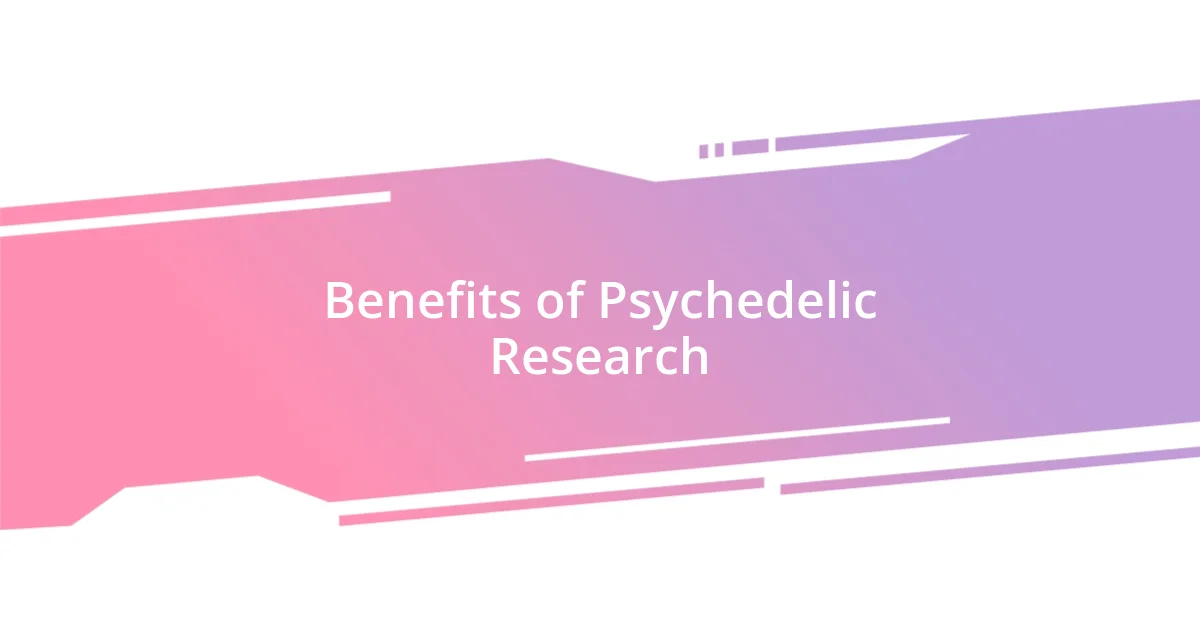
Benefits of Psychedelic Research
Psychedelic research holds incredible promise for mental health treatment. I recall the moment I discovered studies suggesting psychedelics can significantly reduce symptoms of depression and anxiety. It made me think: what if these substances could unlock healing pathways for people who’ve felt trapped for years? The potential for transformative change is palpable, as researchers uncover how psychedelics can provide relief where traditional therapies fall short.
One of the most exciting aspects of this research is its focus on neuroplasticity—the brain’s ability to reorganize itself by forming new neural connections. I recently came across a study showcasing how psilocybin therapy helped participants literally retrain their brains. It’s astounding to ponder how a substance could facilitate such profound change. This raises important questions about how we view mental illness and healing: could these experiences change societal perception and reduce stigma surrounding mental health treatments?
Furthermore, the benefits of integrating psychedelics into research extend to personal growth and increased creativity. I vividly remember attending a workshop featuring individuals who explored these substances and found deeper insights into their life paths. It made me wonder: how many brilliant ideas or innovative solutions are we simply missing out on because we remain confined by outdated regulations? By supporting psychedelic research, we open doors not only for healing but also for expanding the frontiers of human potential.
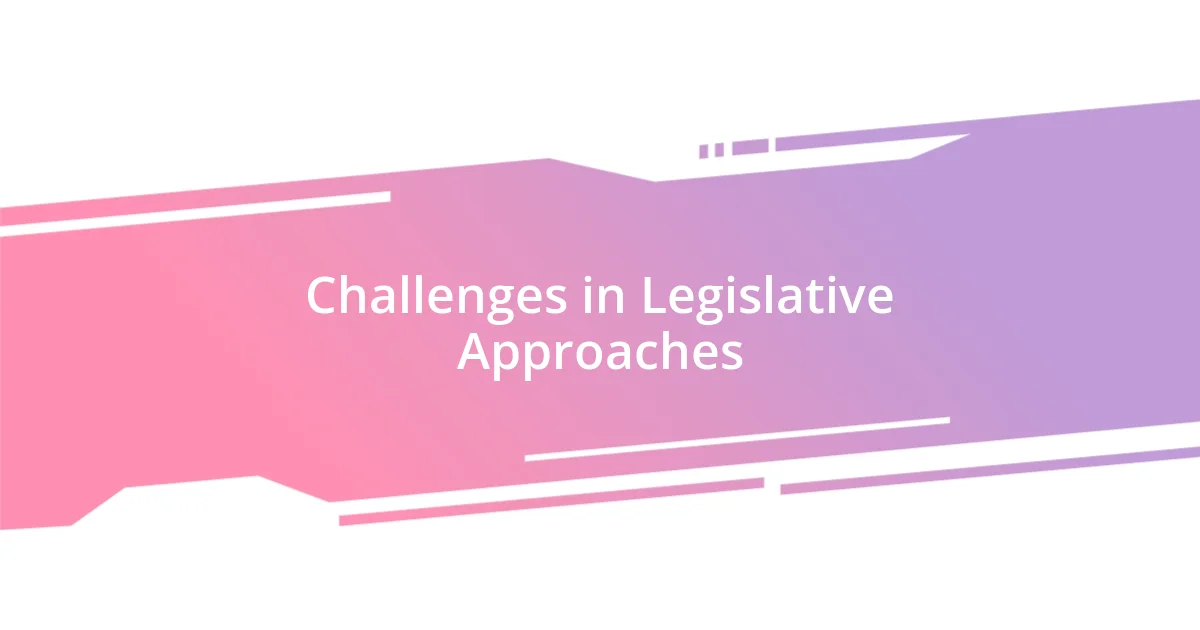
Challenges in Legislative Approaches
Navigating the legislative landscape for psychedelics can feel like a labyrinth. I’ve attended numerous discussions where policymakers grapple with the dichotomy of science and public perception. It’s fascinating yet frustrating to observe how decades of stigma surrounding these substances can cloud reasoned debate, delaying potential reforms that could benefit so many.
One significant challenge is the lack of robust research due to historical prohibitions. In one of my conversations with a researcher, they expressed a palpable sense of exasperation about the limited funding options available. In their experience, promising studies often stall due to red tape, which makes me wonder: how many breakthroughs are we missing simply because the system isn’t set up to support this line of inquiry?
Moreover, there’s a patchwork of regulations that complicates matters further. I remember discussing with advocates who are tirelessly working to unify approaches across state lines. It struck me that if we cannot establish a consistent framework, we risk perpetuating inequalities in access and treatment options. So, how do we ensure that those who could benefit most from these therapies aren’t left behind? This ongoing struggle for coherence in legislation underscores the urgent need for policy thinkers to engage more deeply with the evolving science—something I hope becomes a priority.
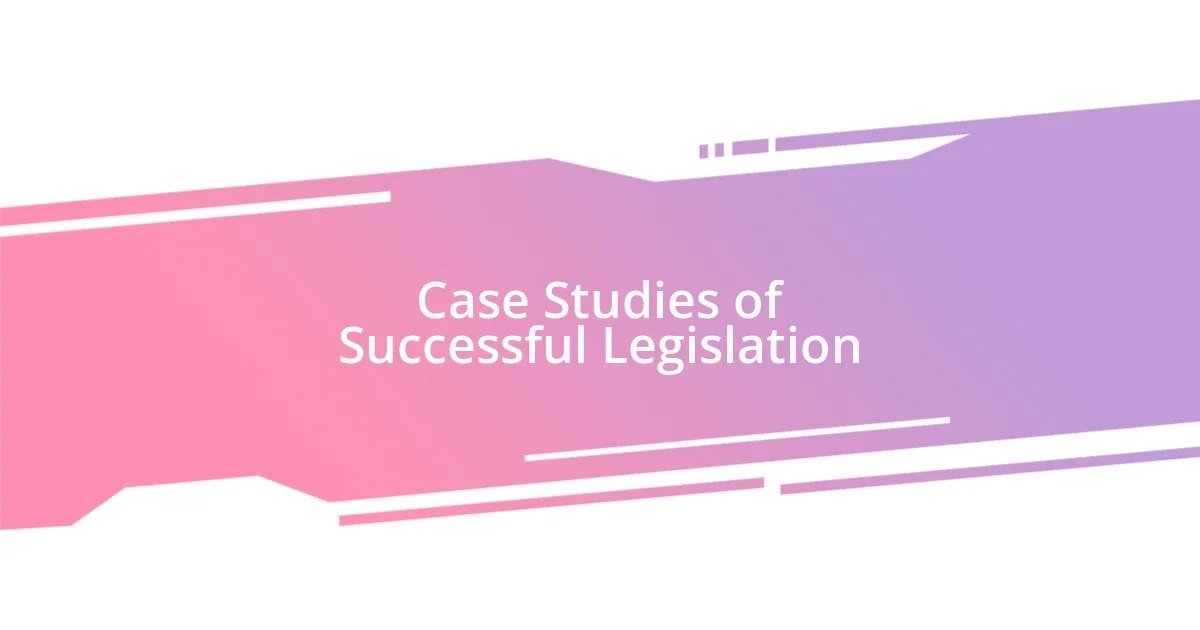
Case Studies of Successful Legislation
Certainly! Here are the requested paragraphs focusing on “Case Studies of Successful Legislation” in the context of psychedelic research:
One standout example of successful legislation can be seen in Oregon, which became the first state to legalize psilocybin therapy through Measure 109 in 2020. I remember following the campaign’s progress and feeling inspired by how it mobilized a community that passionately advocated for mental health solutions. The measure not only allows for regulated psilocybin use but also emphasizes the importance of training qualified facilitators to ensure safety and efficacy. Isn’t it incredible that a state took such a bold step toward a more compassionate approach to mental health?
Another compelling case is the decriminalization of psychedelics in cities like Denver and Oakland. Witnessing these local movements unfold, I felt a mix of hope and astonishment. Residents rallied together to change laws, leading to discussions that question the narrative around psychedelics altogether. It’s a fascinating demonstration of grassroots activism—when communities unite for change, who knows what other doors may open?
Lastly, Canada’s recent reforms around the medical use of psilocybin for terminal illness patients highlights a significant shift in legislative attitudes. Reflecting on this, I recall hearing from individuals who experienced profound relief and clarity during their end-of-life journeys. This raises the question: how can we prioritize compassionate care in the face of previous stigmas? It’s thrilling to see legislative frameworks adapting to address human experience, prioritizing empathy, and paving the way for future innovations.



